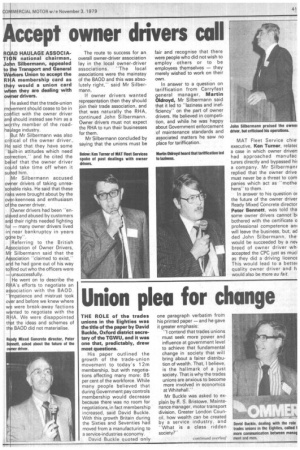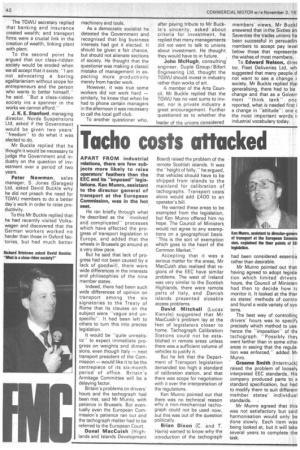Union plea for change
Page 43

Page 44

If you've noticed an error in this article please click here to report it so we can fix it.
THE ROLE of the trades unions in the Eighties was the title of the paper by David Buckle, Oxford district secretary of the TGWU, and it was one that, predictably, drew most questions.
His paper outlined the growth of the trade-union movement to today's 12m membership, but with negotiations affecting many more: 85 per cent of the workforce. While many people believed that during Government pay controls membership would decrease because there was no room for negotiations, in fact membership increased, said David Buckle. With this growth Britain during the Sixties and Seventies had moved from a manufacturing to a service-industries economy. • David Buckle quoted only one paragraph verbatim from his printed paper — and he gave it greater emphasis: "1 contend that trades unions must seek more power and influence at government level to achieve that fundamental change in society that will bring about a fairer distribution of wealth. That, I believe, is the hallmark of a just society. That is why the trades unions are anxious to become more involved in economics at Whitehall."
Mr Buckle was asked to explain by R. S. Bristowe, Maintenance manager, motor transport division, Greater London Council, how wealth can be created by a service industry, and "What is a class ridden society?" The TGWU secretary replied that banking and insurance created wealth; and transport firms were a crucial link in the creation of wealth, linking plant with plant.
To the second point he argued that our class-ridden society would be eroded when we all accept that it exists. ''l am not advocating a boring egalitarianism without scope for entrepreneurs and the person who wants to better himself," he said. "But a class-ridden society ins a spanner in the works we cannot afford."
J. K. E. Stanford, managing director, Norde Suspensions Ltd, asked if the Government would be given two years' "freedom" to do what it was elected to do.
Mr Buckle replied that he thought it would be necessary to judge the Government and industry on the question of investment over a period of two years.
Peter Newman, sales manager, S. Jones (Garages) Ltd, asked David Buckle why he did not preach the need for TGWU members to do a better day's work in order to raise productivity.
To this Mr Buckle replied that he had recently visited Volkswagen and discovered that the German workers worked no harder than those in Oxford factories, but had much better machinery and tools.
As a democratic socialist he .detested the Government and recognised that big business interests had got it elected. It should be given a fair chance, but should not alienate sections of society. He thought that the questioner was making a classic mistake of management in expecting more productivity merely from harder work.
However, it was true some workers did not work hard — similarly, he knew that when he had to phone certain managers in the afternoon it was necessary to call the local golf club.
To another questioner who, after paying tribute to Mr Buckle's sincerity, asked about criteria for investment, he replied that many managements did not want to talk to unions. about investment. He thought they would have to in future.
John McHugh, consulting engineer, Duple Group / Bifort Engineering Ltd, thought the TGWU should invest in industry rather than works of art.
A member of the Arts Council, Mr Buckle replied that the TGWU has no vast sums to invest, nor is private industry a great encouragement. Further questioned as to whether the leader of the unions considered members' views, Mr Buckl answered that inthe Sixties an Seventies the trades unions ha been successful in persuadin members to accept pay level below those that represent& the wishes of most members.
To Edward Nelson, direc tor, Fleet Deliveries Ltd, wh suggested that many people d not want to see a change i society, Mr Buckle replied thai generalising, there had to be change and that as a GoVerr ment "think tank" onc reported, what is needed first i a change in "attitude": one c the most important words ii industrial vocabulary today.




























































































































